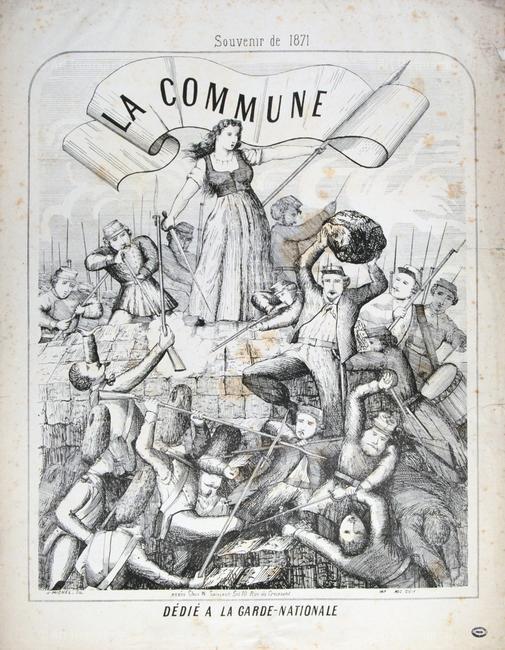Tanked up on rage, the mob is on the move. It wears a tame face here in my town: lawn signs, righteous statements in store windows, and silent vigils for BLM. But under the mask—both the disposable kind and the indelible one stamped on polite conformist psyches—lies the same disdain for our country. And the same assent to blood libel against white Americans. It is not necessary to replay here all that you have already read on the maelstrom of anti-Americanism whirling across the nation. Better to revisit, and hold close, passages from Frank Sheed’s comments on political order in Society and Sanity. Written in 1953, they bear on our own day:
It is a delusion to think that men will love mankind more if they love their countrymen less. Indeed, the internationalists one meets, who have risen beyond love of country, seem to have shed a good deal of love in the process; they do not strike me as especially loving. . . . The man who lacks love for his country is a diminished man: not so diminished as if he lacked love for his family, but there is less to him all the same. A man need not be born there to feel it; he may have come from another country . . . [and] he can genuinely love his chosen country—but not if his own children do not.

Not if his own children do not. There’s the rub. Beginning in the 1960s and ’70s the schools gradually inoculated the next generation against the virtue of patriotism. We are left now with the ominous spectacle of growing portions of the electorate ignorant of the beauty, however imperfect, of its own inheritance. Writing in the post-war calm, Sheed could not imagine how prophetic these words would prove to be:
The country, if one there be, which does not inspire love is a diminished country, and, however well-organized the state, it is not stable. As in marriage, stability does not rest upon concrete foundations but on a thing so intangible as love, the one thing stronger than death.
Careful to distinguish between patriotism and crude nationalism, he wrote:
Patriotism, like family affection, is an expression of love. Nationalism, like snobbery, is an extension of egoism. . . . The mark of the Nationalist is hatred: he almost invariably hates some other country more than he loves his own; he takes the intensity of his hatred as a measure of his love, and another’s lack of that hatred as as a lack of love, so that he will rend one of his own countrymen for not having enough.
• • • • •
 Talk of hatred brings Seattle’s insurrection straight to mind. Impetus for the squalid CHAZ/CHOP shanty town posing as an autonomous nation has been festering for decades. Since 1967, certainly. That was the year that Stokely Carmichael and political scientist Charles V. Hamilton changed the character of the civil rights movement with publication of Black Power. The racism of today’s anti-racists is built on the fictions of this founding text: “No matter how ‘liberal’ a white person might be, he cannot ultimately escape the overpowering influence—on himself and on black people—of his whiteness in a racist society.” Feeding the perverted history of The 1619 Project is Carmichael’s dictum that “we must fill ourselves with hate for all white things.”
Talk of hatred brings Seattle’s insurrection straight to mind. Impetus for the squalid CHAZ/CHOP shanty town posing as an autonomous nation has been festering for decades. Since 1967, certainly. That was the year that Stokely Carmichael and political scientist Charles V. Hamilton changed the character of the civil rights movement with publication of Black Power. The racism of today’s anti-racists is built on the fictions of this founding text: “No matter how ‘liberal’ a white person might be, he cannot ultimately escape the overpowering influence—on himself and on black people—of his whiteness in a racist society.” Feeding the perverted history of The 1619 Project is Carmichael’s dictum that “we must fill ourselves with hate for all white things.”
Carmichael and Hamilton provided a blueprint for legitimizing hatred of whites in terms of rational social science. [Alexander Riley, writing in Chronicles, follows the pedigree.]
• • • • •
It could be argued that institutional racism does, indeed, exist. It is called affirmative action. Initially intended by the Johnson administration (1963-96) as a limited, fluid, and temporary counter measure to ease the effects of discrimination in a particular time, it has petrified into a doctrinaire social engineering project. Its purpose is the systematizing of diversity, an ideology that seeks “fewer whites, fewer men, and fewer heterosexuals.” And as Harvard admission policies testify, fewer Asians, too. [Read David Azerrad’s “The Social Justice Endgame“ in Claremont Review of Books.]
• • • • •
Tuition paying parents of students at the University of Wisconsin-Madison can thank dogmatic diversity for what is easily the low-water mark of inter-sectional affirmative ignorance. The College Fix has it covered:
As rioters in Madison, Wisc., pulled down a statue of a noted abolitionist and a monument to women’s suffrage on Tuesday night, they had a supporter in a University of Wisconsin-Madison Associate Professor of Gender and Women’s Studies. . . . Professor Sami Schalk, who describes herself on Twitter as a “Sarcastic fat Black disabled queer femme,” tweeted in support of the rioters throughout the night, even as a gay Democratic state senator was attacked for filming the unrest.
Sarcastic fat Black disabled queer femme. This is the kind of self-description an obnoxious, attention-seeking class clown submits to the high school year book. But Dr. Schalk is a tenured embodiment of higher learning.
• • • • •
The abolitionist whose statue came down was Col. Hans Christian Heg, a Norwegian immigrant passionately committed to eradicating slavery in his adopted country. A member of the Free Soil Party, which opposed expansion of slavery into Western states, he also led a militia against slave-catchers in Wisconsin. Mortally wounded fighting against the Confederacy, this Scandinavian-born white male died so that this woman could trumpet her raw resentments. And could one day be free to panhandle on Twitter for funds to keep the mayhem going:
Roger Kimball’s tenured radicals have had thirty years to produce tenured louts. If your daughter wants to take gender and/or women’s studies, you might want to put away your checkbook. Let her pay her own way to the sandbox.
This is the manner in which Dr. Schalk celebrated tenure. Orwell was right: “There’s always room for one more custard pie.”
Celebrated #tenure by #twerking to @Beyonce in a pool of giant plastic sprinkles at @MUSOFICECREAM.
Like ya do. pic.twitter.com/rcvPuPHivc— Dr. Sami Schalk (@DrSamiSchalk) November 16, 2019



